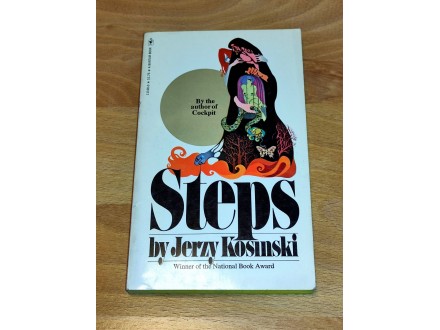Jerzy Kosinski - Steps
| Cena: |
| Stanje: | Polovan bez oštećenja |
| Garancija: | Ne |
| Isporuka: | Pošta CC paket (Pošta) Post Express Lično preuzimanje |
| Plaćanje: | Tekući račun (pre slanja)
Lično |
| Grad: |
Novi Beograd, Beograd-Novi Beograd |
Godina izdanja: Ostalo
ISBN: Ostalo
Jezik: Engleski
Autor: Strani
Won the U.S. National Book Award for Fiction in 1969.[5] Canadian critic Hugh Kenner in his review of Steps in The New York Times compared it to the works by Louis-Ferdinand Céline and Franz Kafka.
Kosiński was born Josef Lewinkopf to Jewish parents in Łódź, Poland. As a child during World War II, he lived in central Poland under a false identity his father gave him to use, Jerzy Kosiński. A Roman Catholic priest issued him a forged baptismal certificate. The Kosiński family survived the Holocaust thanks to local villagers, who offered assistance to Jewish Poles often at great personal risk (the penalty for assisting Jews in Nazi-occupied Poland was death). Kosiński`s father received help not only from Polish town leaders and churchmen, but also from individuals such as Marianna Pasiowa, a member of the Polish underground network helping Jews to evade capture. The family lived openly in Dąbrowa Rzeczycka near Stalowa Wola, and attended church in nearby Wola Rzeczycka, obtaining support from villagers in Kępa Rzeczycka. They were sheltered temporarily by a Catholic family in Rzeczyca Okrągła. The young Jerzy even served as an altar boy in a local church.
After World War II, Kosiński remained with his parents in Poland, moved to Jelenia Góra, and earned degrees in history and political science at the University of Łódź. He worked as an assistant in Institute of History and Sociology at the Polish Academy of Sciences. In 1957, he emigrated to the United States, creating a fake foundation which supposedly sponsored him; he later claimed that the letters from eminent Polish communist authorities guaranteeing his loyal return, which were needed for anyone leaving the communist country at that time, had all been forged by him.
After taking odd jobs to get by, such as driving a truck, Kosiński graduated from Columbia University, and in 1965 he became an American citizen. He received grants from Guggenheim Fellowship in 1967, Ford Foundation in 1968, and the American Academy in 1970, which allowed him to write a political non-fiction book, opening new doors of opportunity. In the States he became a lecturer at Yale, Princeton, Davenport University, and Wesleyan.
Kada kliknete na KUPI ODMAH i naručite predmet automatski ćete dobiti poruku sa svim podacima za uplatu.
OBAVEŠTENJE ZA KUPCE SA KOSOVA I METOHIJE!!!
Slanje knjiga na Kosovo je moguće samo na rizik kupca. U jednom trenutku je bilo problema na administrativnoj liniji, ne znam kakva je situacija sad.
Knjige starije od 50 godina, kao i knjige objavljene ove godine ne šaljem u inostranstvo zbog komplikovane carinske procedure.
Predmet: 77405681









